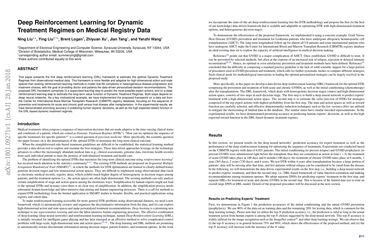Deep Reinforcement Learning for Dynamic Treatment Regimes on Medical Registry Data
This paper presents the first deep reinforcement learning (DRL) framework to estimate the optimal Dynamic Treatment Regimes from observational medical data. This framework is more flexible and adaptive for high dimensional action and state spaces than existing reinforcement learning methods to model real-life complexity in heterogeneous disease progression and treatment choices, with the goal of providing doctor and patients the data-driven personalized decision recommendations. The proposed DRL framework comprises (i) a supervised learning step to predict the most possible expert actions, and (ii) a deep reinforcement learning step to estimate the long-term value function of Dynamic Treatment Regimes. Both steps depend on deep neural networks. As a key motivational example, we have implemented the proposed framework on a data set from the Center for International Bone Marrow Transplant Research (CIBMTR) registry database, focusing on the sequence of prevention and treatments for acute and chronic graft versus host disease after transplantation. In the experimental results, we have demonstrated promising accuracy in predicting human experts' decisions, as well as the high expected reward function in the DRL-based dynamic treatment regimes.
PDF Abstract
